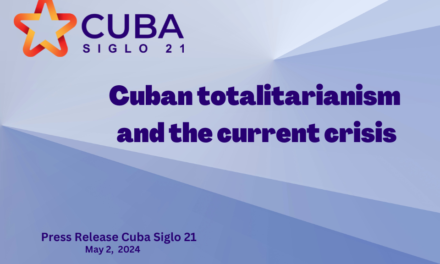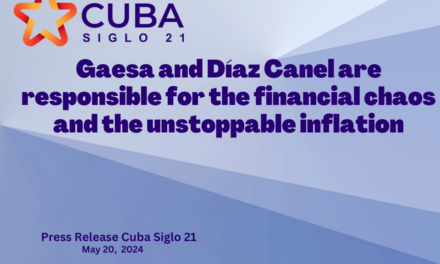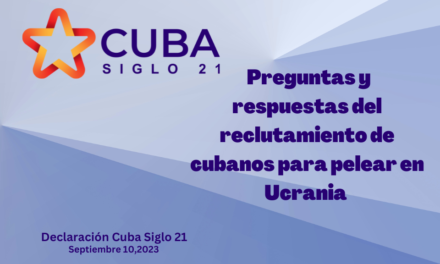Descargar Reporte Completo en PDF
Download Complete Report in English PDF
Ver Sumario Ejecutivo Español
See Executive Summary English
(Sept 19) Cuba Siglo 21 launches the Dossier “Remittances: GAESA undermine the Cubans prosperity”. Emilio Morales, author of the study, affirms that remittances are the financial support for the subsistence of millions of Cubans. But government entity GAESA for their appropriation has propped up a regime that, despite this constant injection of capital, is collapsing due to its own incompetence.
In thirty years, the exile community has sent Cuba a total of $52,251.99 million in cash, and another $50 billion in consumer goods. This has been the juiciest and most interest-free line of credit that the autocracy that controls power in Cuba has been able to accommodate to its convenience and interests.
The amount of these remittances is an indication of the investment potential of the diaspora in the future reconstruction and development of the island once the necessary political and economic freedoms are in place, which today are still non-existent.
Remittances were not conceived to change the economic model and develop the country. From the beginning, remittances to Cuba -as well as foreign investments and tourism- were conceived by Fidel Castro as a temporary response -which he could eventually reverse or regulate if necessary- to the regime’s need for survival, not as an opportunity to develop the economy. A “necessary evil” and always reversible.
The author classifies the flow of remittances in three stages.
In the 1993-2006 period, Cuba received a total of US$11,751 million in cash remittances. The second stage (2007-2018) had the greatest impact. Remittances reached a volume of 31,311.47 million dollars in cash. In the third stage (2019-2023) there is a large decline in remittances by falling 70.83% in 2021 ($1,084.01 million) compared to 2019 (3,716.71) pre-pandemic year. In 2022, the first post-pandemic year, remittances reached $2,040.25 million, a decline of 45.1% compared to 2019.
The remittances are a round business for the Cuban regime because, as the author demonstrates in this study, the dollars never reach the hands of the Cubans; they remain in the bank accounts of the companies managed by GAESA outside Cuba. Cubans receive the remittances in bank cards that can only used to buy in GAESA’s own stores (where they are sold products at double, triple or more their import cost) or to withdraw in Cuban pesos the equivalent of the foreign currency that was deposited, but at the official exchange rate, many times lower than its real value. You can never actually withdraw the dollars sent by your relative.
From the beginning, remittances in Cuba were always controlled by companies in the hands of the military apparatus (MININT – MINFAR) of the government. First CORPORACION CIMEX, then GAESA that finally consolidated this business.
Even though this perfect machinery of citizen control and enrichment has been operating for 30 years, a process of dismantling this dependence is beginning to be observed. This is coming from the diaspora and Cuban residents on the island. The 45% decline in remittances with respect to the year prior to the pandemic reflects this.
If remittances to Cuba over the last 30 years have demonstrated anything, it is the real financial potential of the Cuban nation -understood as a transnational population based on the island and the diaspora- to be able to rapidly transform the country the day that basic freedoms are restored and respected. In three years, the country would be a different one.
The lack of market and business freedoms – such as the absence of legal ownership of businesses, freedom to invest in any sector and to expand as a company – has prevented remittances from being freely capitalizable and have been mostly dedicated to subsistence consumption for those who receive them.
The Cuban diaspora has the potential to inject more than 20 billion dollars in a period of 24 to 36 months if the country transitions to a democracy with rule of law and free market. It is not only the multimillionaires of Cuban origin, but also the hundreds of thousands who could invest part of their savings or take out lines of credit to set up businesses with their relatives in the country of their birth.
The so-called Revolutionary Offensive of 1968 destroyed 55,636 medium and small businesses. The policies implemented since then to control the conditions of approval and operation of any private enterprise have asphyxiated the potential of the national productive forces. The much-propagandized MSMEs (Mipymes) barely number 8,000 businesses and do not function in a context of free enterprise and free market.
The State’s insistence in authorizing the existence of any business is to be able to discriminate against citizens for their political or religious beliefs or for the simple fact that they have another country for residence and exclude all of them (millions of Cubans) from investing in the Cuban economy. If the State does not legally recognize the private ownership of every business, then we are not in the presence of a private sector. No private sector, nor private businesses, or private entrepreneurs will exist in Cuba until the State -among other things- does not legally recognize the right of these business to decide in what sectors to invest, to select its partners among Cubans or foreigners within the island and abroad, to export and import directly, to set the prices of their products and services and sell them directly or through an agency of their choosing.
To take advantage of this potential, it is necessary to free the market and entrepreneurs from economic regulations that today reigns on the island and that the elites every now and then tries to hide its nature behind false entrepreneurs and MSMEs, that the oligarchy seeks to publicize to eliminate or circumvent the sanctions against the Cuban regime. Playing along with their maneuvers or even worse, to financially support them, would only prolong the agony of the Cuban people.
It is the Cubans themselves residing on the island – in alliance with their relatives abroad – who can truly be the co-owners of a truly free new entrepreneurial fabric which would be the immediate and surest engine to recover the well-being of the population, as well as to promote national reconstruction and development.







